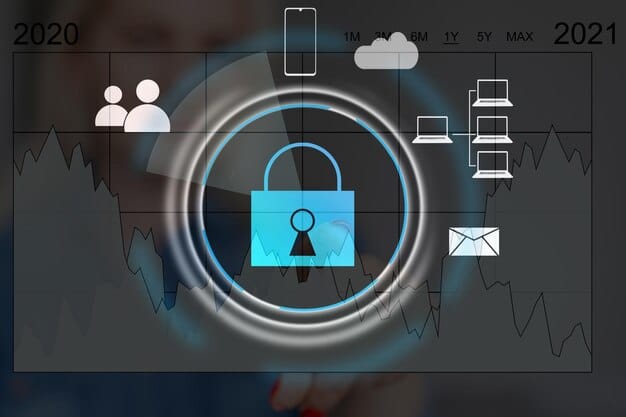Alert: Increase in Scams Targeting Seniors – Protect Yourself from Fraud

An alarming surge in scams targeting seniors across the US demands immediate attention. This alert focuses on understanding these fraudulent schemes and implementing vital protective measures to shield our elderly population.
The digital age has brought unprecedented convenience, but it has also opened new avenues for malicious actors. Recently, there has been an alert: increase in scams targeting seniors – protect yourself from fraud. This isn’t just a statistic; it’s a harsh reality impacting countless families across the nation. Understanding and addressing this growing threat is more crucial than ever.
Seniors are increasingly becoming targets due to various factors such as perceived wealth, trust, and sometimes, a lack of familiarity with modern technology. But with awareness and proactive measures, we can turn the tide. Let’s delve into the specifics of these scams and how to safeguard our loved ones.
Understanding the Alarming Rise in Senior Scams
The recent increase in scams targeting seniors is a disturbing trend that requires immediate attention. These scams are becoming more sophisticated and harder to detect, making it crucial to understand the underlying factors contributing to this rise.
Why Are Seniors Targeted?
Several elements make seniors particularly vulnerable to fraud. These include:
- Perceived Wealth: Scammers often assume that seniors have accumulated significant savings or assets over their lifetimes.
- Trust and Politeness: Many seniors were raised in an era where politeness and trust were highly valued, making them less likely to question suspicious requests.
- Technological Inexperience: Less familiarity with technology can make seniors vulnerable to online scams and phishing attempts.
- Loneliness and Isolation: Scammers exploit feelings of loneliness by offering companionship or assistance, gaining trust before asking for money.
 Understanding these vulnerabilities is the first step in preventing scams.
Understanding these vulnerabilities is the first step in preventing scams.
Common Types of Scams Targeting Seniors
Scams come in many forms, but some are particularly prevalent among seniors. Recognizing these types can help you or your loved ones identify and avoid them:
- Phone Scams: These often involve imposters claiming to be government officials, family members in distress, or lottery representatives.
- Email Scams: Phishing emails designed to steal personal information or install malware on devices are a common threat.
- Investment Scams: Unsolicited investment opportunities promising high returns with little to no risk.
- Home Repair Scams: Fraudulent contractors offering quick fixes for roofing, paving, or other home issues.
Being aware of these common tactics can significantly reduce the risk of falling victim to a scam. It is crucial to stay informed and vigilant.
In conclusion, the increase in scams targeting seniors is driven by several factors, including perceived wealth, trust, and technological inexperience. By understanding these vulnerabilities and the common types of scams, we can take proactive steps to protect ourselves and our loved ones from fraudulent schemes.
Protecting Yourself: Essential Fraud Prevention Tips
Protecting yourself from fraud requires a proactive approach. By implementing certain strategies, you can significantly decrease your risk of becoming a victim of scams. Taking preventive measures is critical in safeguarding your financial well-being.
Stay Informed and Educated
One of the most effective ways to protect yourself is to stay informed about the latest scams and fraudulent schemes. Knowledge is your best defense. Being updated on the latest tactics used by scammers will empower you to recognize and avoid potential threats.
- Follow Reputable Sources: Stay up-to-date on consumer protection alerts from organizations like the Federal Trade Commission (FTC) and the Better Business Bureau (BBB).
- Attend Workshops and Seminars: Participate in educational programs offered by community centers, senior organizations, and financial institutions.
- Share Information: Discuss scams with friends, family, and neighbors to spread awareness and help others stay informed.
Education is a continuous process, and staying informed is a powerful tool in fraud prevention.
Secure Your Personal Information
Protecting your personal information is paramount. Scammers often use stolen or compromised data to carry out their schemes. Safeguarding your sensitive information can significantly reduce your vulnerability.
- Shred Documents: Always shred sensitive documents, such as bank statements, credit card bills, and medical records, before discarding them.
- Use Strong Passwords: Create complex, unique passwords for all your online accounts and update them regularly.
- Beware of Phishing: Be cautious of unsolicited emails, calls, or texts asking for personal information. Never share your Social Security number, bank account details, or credit card numbers unless you initiated the contact.
 Maintaining the security of your personal data is a crucial step in preventing fraud.
Maintaining the security of your personal data is a crucial step in preventing fraud.
Be Wary of Unsolicited Contacts
Unsolicited contacts are a red flag. Scammers often initiate contact through phone calls, emails, or even home visits. Approaching these interactions with caution can save you from potential scams.
- Verify Identity: If someone claims to represent a government agency or company, verify their identity independently. Look up the organization’s official phone number and call them directly.
- Resist Pressure: Scammers often create a sense of urgency to pressure you into making quick decisions. Take your time to consider offers and seek advice from trusted sources.
- Never Send Money: Never send money to someone you haven’t met in person or to an unknown entity without verifying their legitimacy.
Exercising caution when contacted by strangers is a key aspect of fraud prevention.
In summary, protecting yourself from fraud requires a multi-faceted approach, including staying informed, securing personal information, and being wary of unsolicited contacts. By implementing these strategies, you can significantly reduce your risk of becoming a victim of fraudulent schemes.
Recognizing the Signs of a Scam: Red Flags to Watch Out For
Identifying the red flags of a scam is crucial for preventing fraud. By recognizing potentially fraudulent situations, you can avoid falling victim to scams targeting seniors and protect your financial well-being.
Unusual Requests for Money
A common red flag is an unusual request for money, especially if it involves methods like wire transfers or gift cards. Scammers often prefer these methods because they are difficult to trace.
- Wire Transfers: Be wary of requests to wire money to unknown individuals or entities. Wire transfers are like sending cash and are nearly impossible to recover.
- Gift Cards: Scammers often ask for payment in the form of gift cards, promising something in return. Once you provide the gift card codes, the money is gone.
- Cash Deposits: Be cautious of requests to deposit cash into unfamiliar accounts.
If someone asks you to send money in these forms, it’s a major red flag.
Pressure to Act Immediately
Scammers often create a sense of urgency to pressure victims into making quick decisions, before they have time to think or consult with someone they trust. This tactic is designed to bypass critical thinking.
- Limited-Time Offers: Be skeptical of offers that are only valid for a short period.
- Threats: Watch out for threats of legal action or financial ruin if you don’t comply immediately.
- Emotional Appeals: Scammers may use emotional stories to manipulate you into sending money.
Remember, legitimate businesses and organizations will give you time to consider your options.
Inconsistencies and Errors
Look for inconsistencies and errors in communication or documentation. Scammers often make mistakes that are easily overlooked but can reveal their true intentions. Spelling and grammatical errors can be a sign of a scam.
- Incorrect Details: Be wary of inconsistencies in names, addresses, or other personal information.
- Unprofessional Communication: Look out for poor grammar, spelling errors, and unprofessional language.
- Unverifiable Information: If the information provided cannot be verified through legitimate channels, it’s a red flag.
Paying attention to details can help you detect a potential scam.
In conclusion, recognizing the signs of a scam is essential for protecting yourself from fraud. Unusual requests for money, pressure to act immediately, and inconsistencies in information all serve as red flags to watch out for. By being vigilant and skeptical, you can avoid falling victim to these fraudulent schemes. The alert: increase in scams targeting seniors – protect yourself from fraud emphasizes the importance of being aware of these red flags.
Reporting Fraud: Steps to Take If You Suspect a Scam
If you suspect you’ve been targeted by a scam, taking immediate action is crucial. Reporting fraud not only helps protect yourself but also prevents scammers from victimizing others. Knowing the proper steps to take can make a significant difference.
Contact Your Bank or Credit Card Company
The first step is to contact your bank or credit card company immediately. Report any unauthorized transactions or suspicious activity. Prompt action can help prevent further financial loss.
- Cancel Cards: If you shared your credit card information, cancel your card to prevent further charges.
- Monitor Accounts: Keep a close watch on your bank and credit card statements for any signs of fraud.
- Change PINs and Passwords: Update your PINs and passwords to protect your accounts from unauthorized access.
Quickly notifying your financial institutions is a critical step in mitigating the impact of fraud.
File a Report with the Federal Trade Commission (FTC)
File a report with the FTC at IdentityTheft.gov or call 1-877-FTC-HELP. The FTC collects reports about scams and uses the data to build cases against scammers. Your report can help law enforcement agencies track down and prosecute fraudsters.
- Provide Details: Include as much information as possible about the scam, such as the scammer’s contact information, the method of communication, and any financial losses you incurred.
- Keep Records: Save any relevant emails, text messages, or documents related to the scam.
- Follow Up: Check the FTC’s website for updates on your report and any actions taken.
Reporting to the FTC is an essential part of combating fraud on a national scale.
Contact Local Law Enforcement
Report the scam to your local police department or sheriff’s office. Local law enforcement agencies can investigate scams that occur within their jurisdiction and provide assistance to victims.
- Gather Evidence: Compile all relevant information and evidence related to the scam.
- Cooperate with Investigations: Provide information to law enforcement and cooperate with any investigations.
- Seek Support: Local law enforcement can also provide resources and support to victims of fraud.
Involving local law enforcement agencies adds another layer of protection and can help prevent future scams in your community.
In conclusion, reporting fraud is a crucial step in protecting yourself and preventing others from becoming victims. Contact your bank or credit card company, file a report with the Federal Trade Commission (FTC), and contact local law enforcement. The recent alert: increase in scams targeting seniors – protect yourself from fraud highlights the need for swift action when fraud is suspected, ensuring that you take the appropriate steps to protect your financial well-being and help bring scammers to justice.
Supporting Seniors: Community Resources and Family Involvement
Supporting seniors in fraud prevention requires a community effort. Resources and family involvement are crucial components in safeguarding our elderly population. Strengthening community support and family assistance can significantly reduce the vulnerability of seniors.
Community Organizations and Programs
Numerous community organizations and programs offer support and resources for seniors. Partnering with these groups can provide valuable assistance in fraud prevention.
- Senior Centers: Offer educational workshops, support groups, and resources on fraud prevention.
- Area Agencies on Aging: Provide information on local resources and services for seniors, including fraud prevention programs.
- Volunteer Organizations: Offer assistance with tasks such as bill paying and financial management to help seniors avoid scams.
Connecting seniors with community resources can provide them with the support they need to stay safe.
Family Involvement and Communication
Engaging family members in fraud prevention is essential. Regular communication and involvement can help seniors stay informed and protected. Open communication within families is key to preventing fraud.
- Regular Check-Ins: Schedule regular check-ins with senior family members to discuss any concerns or suspicious activity.
- Financial Discussions: Help seniors manage their finances and discuss any potential investment opportunities or financial decisions.
- Education: Educate senior family members about common scams and how to recognize red flags.
Family involvement provides an added layer of protection and ensures that seniors have a trusted source of support.
Utilizing Technology to Help
Technology can be a valuable tool in supporting seniors in fraud prevention. Using technology wisely can help seniors avoid scams and stay protected.
- Scam Blocking Apps: Install scam blocking apps on seniors’ phones to filter out potential scam calls.
- Security Software: Ensure seniors’ computers have up-to-date security software to protect against malware and phishing attempts.
- Remote Monitoring: Use remote monitoring tools to keep an eye on seniors’ online activity and provide assistance when needed.
Leveraging technology can enhance the safety and security of seniors.
In conclusion, supporting seniors in fraud prevention requires a community effort and family involvement. Utilizing community organizations and programs, engaging family members in regular communication, and leveraging technology are all essential components in safeguarding our elderly population. The recent alert: increase in scams targeting seniors – protect yourself from fraud underscores the importance of proactive support from communities and families in protecting seniors from fraudulent schemes.
| Key Point | Brief Description |
|---|---|
| 🚨 Recognize Red Flags | Identify unusual requests, pressure to act, and inconsistencies. |
| 🛡️ Secure Info | Protect personal data with strong passwords and shredding documents. |
| 📞 Report Scams | Contact banks, FTC, and local law enforcement immediately. |
| 🤝 Community Support | Engage family and utilize community resources. |
Frequently Asked Questions
Seniors are often targeted due to perceived wealth, trust, technological inexperience, and loneliness. Scammers exploit these vulnerabilities to defraud seniors of their savings. This alert: increase in scams targeting seniors – protect yourself from fraud aims to help you prevent such occurrences.
Common scams include phone scams, email phishing, investment scams, and home repair fraud. Scammers often impersonate government officials, family members, or trusted professionals to gain seniors’ trust.
Seniors can protect themselves by staying informed, securing personal information, being wary of unsolicited contacts, and discussing financial matters with trusted family members or advisors. The alert: increase in scams targeting seniors – protect yourself from fraud emphasizes the importance of vigilance.
If a senior suspects a scam, they should immediately contact their bank or credit card company, file a report with the Federal Trade Commission (FTC), and contact local law enforcement. Quick action can help minimize the damage.
Seniors can find resources at senior centers, area agencies on aging, and volunteer organizations. Additionally, family involvement and regular communication can provide essential support. This will aid to alert: increase in scams targeting seniors – protect yourself from fraud.
Conclusion
As highlighted throughout this article, the alert: increase in scams targeting seniors – protect yourself from fraud is a serious concern that requires proactive measures. By staying informed, securing personal information, and fostering community support, we can collectively protect our vulnerable senior population from falling victim to these schemes.
Remember, vigilance and awareness are key. By implementing the strategies discussed and remaining cautious, you can safeguard yourself and your loved ones from the devastating effects of fraud. Together, we can combat this growing threat and ensure the financial security of our seniors.





